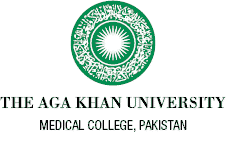What Does a Vascular Surgeon Do?
A vascular surgeon is responsible for preventing, diagnosing, and treating diseases that affect the blood vessels, including arteries and veins. These vessels are crucial for transporting nutrients and oxygen to and removing waste from the body's cells and tissues. Since the body requires a constant supply of oxygen and nutrients, maintaining healthy blood vessels is vital.
What Treatments Can a Vascular Surgeon Offer?
AKUH's Section of Vascular Surgery performs a variety of procedures for a broad spectrum of vascular diseases. These may include blockages in the arteries and veins, blood clots, aneurysms, varicose veins, and any other problem that involves the blood vessels.
Peripheral Artery Disease, common in smokers, diabetics, and people suffering from high blood pressure, is one of the many diseases our Vascular surgeons have expertise in. Some of the procedures offered by our Vascular Surgeons include the below:
- Haemodialysis access surgery: Both routine and complex haemodialysis access created to improve patient care
- Varicose veins procedures: These include endovenous ablation of varicose veins, injection sclerotherapy, stab avulsions, and open surgery for varicose veins.
- Carotid Endarterectomy: To treat narrowed carotid arteries and decrease the risk of stroke.Peripheral Angioplasty: Peripheral vascular disease is prevalent, especially in the elderly, smokers, and diabetic patients. Peripheral angioplasty helps to open blocked arteries and improves blood supply to help wounds heal, and pain subside.
- Endovascular and open Aortic Aneurysm Repair: This is to repair abdominal aortic aneurysms and prevent them from rupturing.
- Open Bypass surgery: Using either native vein or prosthetic graft, this surgery is done to save limbs from major amputation and to treat lifestyle-limiting claudication.
- Port catheter insertion: providing access for long-term chemotherapy.
- Excision of cervical rib to relieve compression on the nerve or the artery.
When to See a Vascular Surgeon?
You should consider visiting a vascular doctor if you have risk factors for vascular disease, such as diabetes, high blood pressure, or a history of tobacco use. Additionally, symptoms like chest pain during exercise, or leg pain, cramping, or swelling may warrant a consultation.
History
The Section of Vascular Surgery evolved from General Surgery and was officially designated as a separate section in 2019, with Dr. Ziad Sophie serving as the inaugural section head.
Teaching
Undergraduate Teaching
MBBS: Fourth-year medical students rotate in Vascular Surgery as part of an integrated vascular-orthopaedical and plastic surgery rotation, which commenced in 2021. In this short rotation, students learn the basics of common vascular conditions, such as acute and chronic limb ischemia, deep venous thrombosis (DVT), diabetic foot, chronic venous insufficiency, and leg ulcers. This rotation includes dedicated teaching sessions and clinical exposure in outpatient settings. Students are formally assessed at the end of this clerkship.
Post-Graduate Teaching
Interns regularly rotate as part of the PGME internship program in Vascular Surgery for two months. They find this rotation valuable for improving their basic surgical skills and gaining ample patient exposure and interaction in dealing with vascular diseases. Very few centers within the country provide this opportunity.
Residency Program
General surgery residents are integral to the Section of Vascular Surgery. Senior General Surgery residents (Years 3, 4, or 5) lead the team along with vascular surgery fellows and junior residents (Years 1 and 2). They are actively involved in teaching and patient care, with the chief resident leading the morning rounds and being actively involved in clinical decision-making.
Fellowship Program
The Department of Surgery at Aga Khan University (AKU) initiated the first-ever dedicated Vascular Surgery training as a two-year fellowship in 2003. This program, now accredited by the College of Physicians and Surgeons Pakistan (CPSP), aims to produce competent and academically sound vascular surgeons. To date, seven fellows have graduated from this program.


